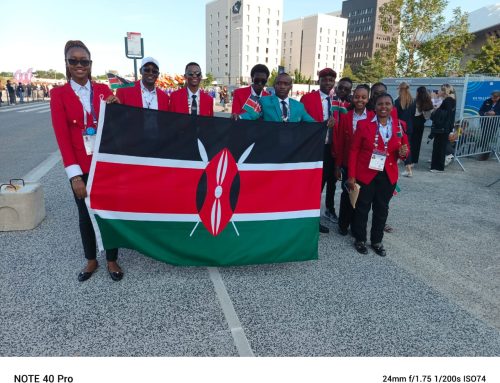A team from TVET Authority led by Director General Dr. Kipkirui Langat, today held a one-day sensitization meeting with principals drawn from national polytechnics at Kenya School of TVET (KSTVET) to fast-track the implementation of respective legal orders.
As an enabler of CBET curriculum, TVET-CDACC was established to develop the CBET curriculum, conduct an assessment of the curriculum and certify the qualifying trainees. To complement TVET-CDACC, the national polytechnics and other institutions in line ministries have the legal authority to prepare curricula, assessments, and certifications. Some of these institutions that have legal mandates include; NITA, Bukura Agricultural College, KMTC, National Polytechnics, and Technical Universities. Further, the TVET Act, 2013 gives National Polytechnics Authorities to offer a Bachelor of Technology degree in collaboration with a university.
In facilitating the implementation of CBET courses in the TVET sector, The TVET Authority has developed CBETA, Trainer Qualification Framework, and PLAR (RPL) standards; the Quality Assurance Manual, guidelines for assessment centers, CBET assessment monitoring tools, accreditation of institutions to offer CBET courses among other interventions. In addition, the regulator has approved over 450 occupational standards and respective curricula and corresponding assessment tools.
Despite these developments, a number of National polytechnics are yet to make significant progress in adopting CBET courses and utilizing their position as Qualification Awarding Institutions (QAI). The National Polytechnic status and QAI status come with a legal mandate of designing, developing, training, assessing, and certifying trainees. Four years since CBET curricula were rolled out, its adoption level in national polytechnics has remained significantly low.
It’s on this basis that TVETA organized a one-day sensitization workshop to build synergies on fast-tracking the implementation of respective legal orders by national polytechnics and building on lessons learned from other institutions like KMTC and Bukura Agricultural College with vast experience in running CBET programme.
In his opening remark, Dr. Kipkirui Langat said that National Polytechnics must ensure the credibility of their certification and safeguard against economic crimes such as fake certificates. He emphasized the need to embrace collaboration with industry and technical universities to ensure the progression of TVET graduates.
Among the main agenda of the meeting was to debunk the role of TVETA in CBET implementation, and adopt lessons of qualification awarding institutions from the perspective of Kenya Medical Training College, Bukura Agricultural College, and technical Universities respectively.
Bukura Agricultural College acting Principal Paul Njogu said that his college has made great strides since its establishment in 1973, moving from one certificate course to 15 diplomas courses,4 certificate courses, and two diploma courses in Technical trainer instructor education. Njogu said that the college has successfully managed the development and implementation of its curriculum, thanks to its key pillars which include; recruitment of qualified staff, training all teaching staff of Training of Trainers (ToT), and training of technical staff on Competency-Based Education and Training (CBET), the existence of an elaborate procedure for curriculum review and development, zero-tolerance to examination malpractices among others.
He pointed out that for institutions of higher learning in the TVET ecosystem to succeed, they must strengthen academic boards.
On the issue of implementation of the CBET approach, Curriculum Development, Assessment, and Certification Council (TVET CDACC) Acting CEO Mrs. Zipporah Messo reiterated the need for the concerted effort that entails the involvement of industry throughout the CBET implementation process.
She advised the principals to ensure the formation of program advisory committees to oversee the development of occupational standards and their implementation.
Gordon Ogalo who is the Registrar, Examinations and KMTC said that the trainer has 72 campuses spread across 44 counties in Kenya. He added that KMTC has collaborated with an array of regulatory bodies and councils, a good example being the Nursing Council of Kenya, Pharmacy and Poison, Kenya Health Practitioners Oversight Authority et cetera. This has enhanced the quality of health-related programs.
In his closing remarks, Dr. Langat said that a technical working group will be formed to oversee the implementation of the roadmap on the legal mandate and CBET implementation. This will include a visit to Rwanda Polytechnic by Principals and their deputies to benchmark its success story on CBET implementation and the latest seamless introduction of undergraduate programs in TVET.
Other members representing TVETA included Director Strategy and Planning Timothy Nyongesa, Director of Accreditation and Outreach Josphine Kasera, Assistant Director Outreach Bibiana Atieno, Assistant Director of Legal Services Sylvia Akoto, Andrew Too -Technical Office of DG and Janice Bogita of Outreach Services.


